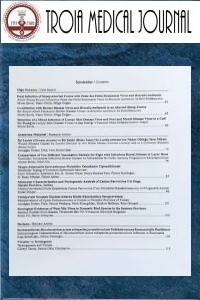Sağlık çalışanlarının covid-19 enfeksiyonunu takiben yaşam kalitesi ve bilişsel profillerinin değerlendirilmesi
Amaç: COVID-19 enfeksiyonu geçirmenin yaşam kalitesi ve bilişsel fonksiyonları düşürdüğüne dair veriler mevcuttur. Çalışmamızda sağlık çalışanlarında COVID-19 enfeksiyonu geçirmenin, yaşam kalitesi ve bilişsel profil ile ilişkisinin incelenmesi amaçlanmıştır.
Yöntem: Bu çalışma Selçuk Üniversitesi Tıp Fakültesi Hastanesi’nde çalışan ve çalışmaya katılmayı onaylayan 306 kişi ile gerçekleştirildi. Tüm katılımcılara sosyodemografik veri formu, Kısa Form-36 (SF-36) Yaşam Kalitesi Ölçeği, Hızlı Kognitif Test (HKT) ve Mini Mental Durum Testi (MMDT) doldurtuldu.
Bulgular: Çalışmaya 306 sağlık çalışanı katılmıştır. Katılımcıların yaş ortalaması 27.58±5.26 olarak bulundu. Katılımcıların %63.7’sinin kadın ve %36.3’ünün erkekti. Çalışmamızda COVID-19 enfeksiyonu geçiren grupta Hızlı Kognitif Test skoru 8.69±0.9 iken geçirmeyen grupta 9.49±0.61 olarak anlamlı fark görüldü. Çalışmada COVID-19 geçiren ve geçirmeyen gruplar arasında SF-36 Yaşam Kalitesi Ölçeği, Hızlı Kognitif Test, Mini Mental Durum Testi sonuçları açısından anlamlı farklar bulundu.
Sonuç: Çalışmamız sağlık çalışanlarında COVID-19 enfeksiyonu geçirmenin yaşam kalitesinde düşme ve bilişsel profillerinde gerileme ile ilişkili olduğunu ortaya koymaktadır. Bu sonuçlar ışığında COVID-19 sebebiyle yaşam kalitesi ve bilişsel profillerinde gerileme olan sağlık çalışanlarına rehabilitasyon imkanı sağlanması. çalışma koşullarının ve yaşam kalitelerinin iyileştirilmesine yönelik stratejiler geliştirilmesi gerekmektedir.
Anahtar Kelimeler:
COVID-19, Yaşam Kalitesi, Bilişsel Durum
Evaluation of quality of life and cognitive profiles of healthcare professionals following covid-19 infection
Objectives: There are data showing that having a COVID-19 infection reduces quality of life and cognitive functions. In our research, it was aimed to examine the relationship between having COVID-19 infection in healthcare workers, quality of life and cognitive profile.
Methods: This study was carried out with 306 people working at Selcuk University Faculty of Medicine
who approved to participate in the study. Sociodemographic data form, Short Form-36 (SF-36) Quality of Life Scale, Rapid Cognitive Test (RCS) and Mini Mental State Test (MMST) were filled out by all participants.
Results: 306 health workers participated in the study. The mean age of the participants was 27.58±5.26 years. 63.7% of the participants were female and 36.3% were male. In our study, there was a significant difference between the Rapid Cognitive Test score of 8.69±0.9 in the group with COVID-19 infection and 9.49±0.61 in the group that did not. In the study, significant differences were found between the groups with and without COVID-19 in terms of the results of the SF-36 Quality of Life Scale, Rapid Cognitive Test, and Mini Mental State Test.
Conclusion: Our study reveals that having COVID-19 infection in healthcare workers is associated with a decrease in quality of life and a decline in their cognitive profiles. In the light of these results, it is essential to provide rehabilitation opportunities for healthcare workers who have a decline in their quality of life and cognitive profiles due to COVID-19 and to develop strategies to improve their working conditions and quality of life.
Keywords:
COVID-19, Quality of Life, Cognitive status,
___
- 1. Zhu N. Zhang D. Wang W. et al.. A Novel Coronavirus from Patients with Pneumonia in China. 2019. N Engl J Med. 2020;382(8):727-733.
- 2.World Health Organization. Timeline: WHO's COVID-19 response. 2021. Erişim adresi: https://www.who.int/emergencies/diseases/novelcoronavirus-2019/interactivetimeline#event-72.Erişim Tari-hi:22.12.2022.
- 3. Ömer A. Sezerol MA. Taşçı Y. Hayran O. COVID-19 pandemisinde görev yapan sağlık çalışanlarında anksiyete belirtileri ve uykusuzluk. Turkish Journal of Public Health. 18(COVID-19 Special). 2020;18:47-57.
- 4. Falvey JR. Ferrante LE. Flattening the disability curve: Rehabilitation and recovery after COVID-19 infection. Heart & Lung : the journal of critical care. 2020;49(5):440-441.
- 5. Yıldırım Dİ. Enes AY. Eryılmaz MA. Gürer N. Çakireli SZ. Keten HB. et al. Effect of COVID-19 social isolation on the fear of COVID-19. quality of life and cognitive functions in the elderly. Cukurova Medical Journal. 2022;47(2):756-764.
- 6. Ware Jr. CD Sherbourne. The MOS 36-item short-form health survey (SF-36): I. Conceptual framework and item selection. Medical care. 1992:473-483.
- 7. Koçyigit H. Kisa Form-36 (KF-36)'nm Turkce versiyonunun guvenilirligi ve gecerliligi. Ilac ve Tedavi Dergisi. 1999;12:102-106.
- 8.Yıldırım Dİ. Yıldırım A. Eryılmaz MA. Sağlık çalışanlarında fiziksel aktivite ile yaşam kalitesi ilişki-si. Cukurova Medical Journal. 2019;44(2): 325-333.
- 9. Malmstrom TK. Voss VB. Cruz-Oliver DM. Cummings-Vaughn LA. Tumosa N. Grossberg GT. et al. The Rapid Cognitive Screen (RCS): A Point-of-Care Screening for Dementia and Mild Cognitive Impairment. J Nutr Health Aging. 2015;19(7):741-4.
- 10. Gungen C. Standardize Mini Mental Test'in Turk toplumunda hafif demans tanisinda gecerlik ve guvenilirligi. Turk Psikiyatri Dergisi. 2002;13:273-281.
- 11. Molloy DW. Standish TI. A guide to the standardized Mini-Mental State Examination. Int Psychogeriatr. 1997;9(1):87-94.
- 12. Kerola T. Hiltunen M. Kettunen R. Hartikainen S. Sulkava R. Vuolteenaho O. et al.. Mini-Mental State Examination score and B-type natriuretic peptide as predictors of cardiovascular and total mortality in an elderly general population. Annals of medicine. 2011;43(8):650-659.
- 13. Jafri MR. Zaheer A. Fatima S. Saleem T. Sohail A. Mental health status of COVID-19 survivors: a cross sectional study. Virology journal. 2022;19(1):1-5.
- 14. Tian T. Huo X. Secondary attack rates of COVID-19 in diverse contact settings. a meta-analysis. The Journal of Infection in Developing Countries. 2020;14(12):1361-1367.
- 15. Li W. Zhang B. Lu J. Liu S. Chang Z. Peng C. et al. Characteristics of household transmission of COVID-19. Clinical Infectious Diseases. 2020;71(8):1943-1946.
- 16. Lin MX. Huang L. Zheng D. Zhang L. Feng B. Liu Y. et al.. Health-related quality of life of COVID-19 survivors at 6 months after hospital discharge: a cohort study. 2021:1-14.
- ISSN: 2630-6107
- Yayın Aralığı: Yılda 3 Sayı
- Başlangıç: 2019
- Yayıncı: Çanakkale Onsekiz Mart Üniversitesi
